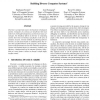Free Online Productivity Tools
i2Speak
i2Symbol
i2OCR
iTex2Img
iWeb2Print
iWeb2Shot
i2Type
iPdf2Split
iPdf2Merge
i2Bopomofo
i2Arabic
i2Style
i2Image
i2PDF
iLatex2Rtf
Sci2ools
129
click to vote
HOTOS
1997
IEEE
1997
IEEE
Building Diverse Computer Systems
Diversity is an important source of robustness in biological systems. Computers, by contrast, are notable for their lack of diversity. Although homogeneous systems have many advantages, the beneficial effects of diversity in computing systems have been overlooked, specifically in the area of computer security. Several methods of achieving software diversity are discussed based on randomizations that respect the specified behavior of the program. Such randomization could potentially increase the robustness of software systems with minimal impact on convenience, usability, and efficiency. Randomization of the amount of memory allocated on a stack frame is shown to disrupt a simple buffer overflow attack.
Related Content
| Added | 06 Aug 2010 |
| Updated | 06 Aug 2010 |
| Type | Conference |
| Year | 1997 |
| Where | HOTOS |
| Authors | Stephanie Forrest, Anil Somayaji, David H. Ackley |
Comments (0)

